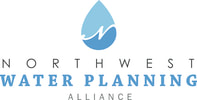|
The winter season is the perfect time of year for communities to become ‘salt smart’ and practice sensible salting! This means being strategic and responsible about salt usage and placement for optimal performance without excess use. It also means incorporating alternative de-icing materials like salt brine and beet juice into snow and ice management to cut back on salt use. Each winter, communities across northeastern Illinois use salt to manage ice on roads, sidewalks, and parking lots. While maintaining public safety during winter conditions is necessary, much of the salt applied to paved surfaces using old methods is excessive and leads to costly economic and environmental impacts. Once you put salt down, it does not go away or breakdown. Instead, it enters and accumulates in waterbodies over time, putting aquatic life at risk, impacting vegetation, and threatens water supplies. Salt is also highly corrosive and can weaken infrastructure such as bridges and roads. It can also stress older water pipes and impact water treatment systems. Unlike sediments and nutrients, chlorides cannot be easily treated or filtered out of water. While road salt is not toxic to drink, concentrations can reach or exceed the secondary standard for drinking water – a point where it starts to taste so salty it’s undrinkable.
Some counties throughout the NWPA region have commissioned studies that show how much salt is impacting local and regional groundwater sources and highlight the need for better salt management practices and coordination of the region’s water supplies. In 2016, Kane County’s 2015 shallow groundwater sampling report confirmed increased concentrations of chlorides in groundwater are from the presence of chloride trends across Illinois waters roadways and road salts. Other studies such as Illinois State Water Survey’s (ISWS) overview of in 2012 present similar findings. In 2020, the Southwest Water Planning Group – a collection of communities is Will, Kendall, and Grundy Counties – commissioned a study by the ISWS that found road salts in local groundwater sources have been increasing since the 1960s and are reaching shallow aquifers that are more than 300 feet below the surface. Recent shifts in roadway salting operations The only way to effectively decrease chlorides is to reduce road salt use and encourage proper application and management. Most county, municipal, and township road and stormwater departments across the NWPA region have already made this transition with salt reduction programs and operations. For example, the McHenry County Division of Transportation’s (DOT) winter operations include trucks with computerized dispensing system for proper placement of deicing materials. They also strive to make salt applications more effective with pre-wetting techniques and liquid de-icing materials, or “anti-icing” organic compounds, that help reduce the amount of salt needed and minimize salt scatter. As of 2017 McHenry County’s DOT received the Salt Institute's Safe and Sustainable Snowfighting Award for 14 consecutive years. The City of Geneva’s Public Works Department also won the award in 2017 for 4 consecutive years. The Lake County DOT received a similar award in 2018 from the American Public Works Association (APWA) for their snow and ice control program that supports innovation, safety, and the environment. Focusing efforts on parking lots and sidewalks In addition to roadway operations, the NWPA’s Sensible Salting Sub-Committee recognizes the need to update salting practices on private parking lots and sidewalks. Liability fears and little information on responsible salt practices has been incentivizing excess use of salt on parking lots and sidewalks.. A key component to sensible salting or being ‘salt smart’ on these paved surfaces is understanding the amount and rate at which salt should be applied based on the surface material and temperature, weather conditions, and application material. Many counties in the NWPA region, including Lake and DuPage, are now holding annual de-icing workshops for both municipal and private entities, such as snow removal companies and contractors, that cover surfaces beyond roadways. More resources for the non-roadway surfaces will be available in 2022. The Conservation Foundation (TCF) recently received a grant to develop a salting best management practices manual for parking lots and sidewalks as well as a training and certification program that will be based on the manual. The manual will build on the one initiated by the NWPA’s Sensible Salting Subcommittee as well as the most up-to-date manuals developed by other nearby states like Minnesota and Wisconsin. With assistance from NWPA members, the Salt Smart Collaborative will be working with TCF to develop these resources which are scheduled to be completed by December 2022. Online resources There are also a handful of resources, beyond those provided by county departments, for both public and private entities to become ‘salt smart’ and learn how to apply sensible salting practices. The Salt Smart Collaborative promotes responsible salting practices and road safety by sharing information on best practices, organizing deicing workshops as well as providing online resources and outreach materials for residents, public agencies, and private snow removal companies. In addition to workshops that are often held in the fall prior to the winter season, there are year-round resources in the form of webinars and downloadable pdfs forms to help apply best practices, such as anti-icing techniques, salt application rate tables, and calibration logs. The NWPA also has a compilation of sensible salting resources developed by partners. In addition, the DuPage River Salt Creek Workgroup has technical resources, including model ordinances for salt storage and handling, as well as educational resources for municipal leaders. Is your community safely and proactively managing roads, parking lots, or sidewalks with ‘salt smart’ or ‘sensible salting’ strategies? Tell us more at info@nwpa.us! Comments are closed.
|
ABOUTThe latest updates page features posts about issues affecting NWPA member communities and best practices, drawing on interviews and conversations with experts. Archives
March 2024
Categories
All
|
